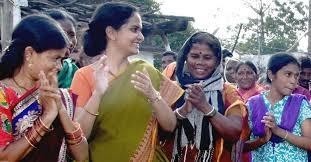Dynamic IAS Officer Has a VillageNamed in Her Honour. Here’s Why!
- Recently, the denizens of Adilabad named a village “Divyaguda” in Divya’s honour. This gesture shows the kind of impact she has left on the people and their gratitude towards her for bringing a change in their lives. The community that Divya worked so closely with won’t forget the proactive lady who believed in providing quick solutions to several issues. Homing in on the basic problems that the region faced – high rates of illiteracy, unemployment, sanitation, irrigation health and floods, among others, she also worked incessantly to resolve the conflicts in the area.
- “I appointed a special officer for the welfare of particularly vulnerable tribal groups to address their issues with more focus and better efficacy. It was important to understand their issues from their perspective, rather than rushing in with changes that were seen to be right by me,” adds the bureaucrat.
- Adilabad is a region with a history of intertribal violence. From curfews to shutting down of data connectivity, the region had seen it all. In such a situation, the open- minded and soft-spoken Divya managed to earn the trust of the tribals and find a place in their hearts.
- Maruthi, a tribal leader from the Thoti community, a particularly vulnerable section, who was also instrumental in naming the village – Divyaguda, tells TBI, “We have had several collectors come and take charge – would you believe me if I said that the first time I stepped into the Collector Office was when Divya madam took charge? Until then no one seemed to care.”
- When asked about the impact the IAS officer created in their lives, he shares, “First and foremost, she made the office accessible to us. She visited each household in the village and knew us all by our names.”
- Learning their Language, Winning their Trust
- Many bureaucrats before Divya had tried to learn Gondi, one of the tribal languages spoken in Adilabad, in an attempt to effectively communicate with them. While a majority of officers stopped with the basics, Divya persisted and learnt enough to be able to hold meaningful conversations with them. “I wanted to make a connection with them, and it wasn’t just about being able to greet them,” dimples Divya. Each day, after work, she diligently spent some time with Durwa Bhumanna, a senior announcer of All India Radio station in Adilabad.
- The fact that Divya learnt the language was of great advantage to her as the issues faced by the people started coming to the fore. They started to trust her as they saw her make a genuine effort to understand them. She helped solve certain long-pending land issues in favour of tribals which were represented in the Monday Grievance Redressal sessions. Also, she streamlined cotton procurement and created platforms for tribals to access Minimum Support Price for their produce. “It was important for us to start a meaningful dialogue with the groups,” says Divya. “Earning their trust was difficult, we were seen as people who had come to take away their rights from them, but we managed to find a middle ground,” says Divya.
- Knowing that a language barrier may prove to be a bottleneck in communication, the IAS officer also appointed a Special Tribal Coordinator and Gondi language translators in the District Hospital (RIMS)
- to ensure better access to treatment. Helping the People Learn their Rights Divya’s primary thrust in Adilabad was to encourage the aggrieved tribes to use the legal and constitutional means to find solutions to their problems.
- To that end, she appointed PESA (The Provisions of the Panchayats (Extension to Scheduled Areas Act, 1996) coordinators at Gram Panchayat level and quickly filled the vacancies to create awareness on their rights and how to use them. She also helped revive their traditional panchayats called Rai Centers and engaged them in developmental activities.
- Furthermore, to duly honour and preserve the culture of the tribal communities, Divya made efforts to officially support their main festivals like Dandari-Gussadi and Nagoba Jatra and document their traditions in the form of a documentary.
- With a firm belief in the power of dialogue and discourse, she knew that she had to find a way to get through the community for arbitration to work. Within three months, the solution-driven lady became proficient in the language of the Gonds (Gondi), enough to have a conversation with the people. And her efforts paid off.
- The people only wanted someone to listen. And she did. “Once they realised I could speak their language, they poured their hearts out. In three months, the scene of the panchayats meetings went from the groups sitting in pindrop silence to speaking freely,” says Divya.
- From appointing special tribal coordinators, language translators in government hospitals, making the administrative office more accessible, to learning the language herself, Divya went from being just an “Officer Madam” to a member of their families. And now, as a new District Collector takes charge, the villagers paid their tribute to her by christening a village in her name. Lorem ipsum dolor sit amet, consectetur adipiscing elit. Ut elit tellus, luctus nec ullamcorper mattis, pulvinar dapibus leo.

